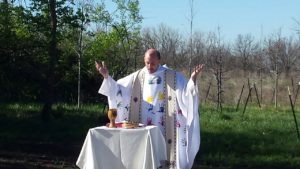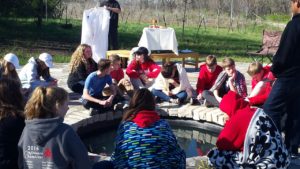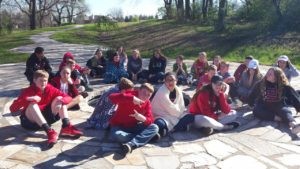Apr 14, 2017
By Timothy Armbruster, Vocation Director
“Living Like Jesus” is the theme chosen for this year’s Catholic School theme. Both St Francis Xavier School, in St. Joseph, as well as St. James Catholic School, in Liberty, have been working with this theme for the school year. In keeping with this theme, this year’s Lenten retreat focused on the word “evangelize.” As part of the retreat, we played off the simple definition of the word as “story-telling.” Throughout the day, each student was invited to think about the different ways they learn and they different stories that they know. How did Jesus teach? Through word and example, through telling stories, through parables. The retreat focused on gathering around a campfire and telling stories. What stories do we tell? What stories of our family? What stories of our faith? It didn’t matter what stories they wished to tell, it was important that they had a story to tell. Story-telling, evangelizing, begins with knowing our story, knowing the story of our faith and sharing it with others. As we concluded the day, each student was given a red or yellow flame to write on with the intention of a story to tell and who to share it with. As each flame was added to the campfire, the flame grew brighter. Pictured here are middle-school students who are sharing their flames and sharing their story.


Apr 14, 2017
By Timothy Armbruster, Vocation Director
After 3 days of various service and community building activities, the Sacred Heart 8th Grade Mission trip wrapped up with Mass on the Labyrinth. It was a beautiful spring morning to be gathered outside. Our mass was celebrated in thanksgiving for the wonderful week of service and a chance to bring together and reflect upon all that happened. The labyrinth was the perfect place to reflect individually on the service each student did as well as be mindful of the connection and outreach to the larger community. At various places, the coordinators and supervisors reminded the students although the work they did might have seemed small and insignificant, they may never know the impact that small act of kindness may have in another person’s life.


Apr 13, 2017
“You were once darkness, but now you are light in the Lord. Live as children of light.” Ephesians 5:8
Dear Members, Companions, and Friends,
The stories of these three days when we enter deeply into the suffering, death and resurrection of Jesus give us so much to contemplate. For example, there are times in our lives when we hear the echoes of Isaiah’s servant in our deep sighs and sleepless nights: “I thought I had toiled in vain, and for nothing, uselessly, spent my strength.” This seems to be the mood of Jesus that night after breaking bread and sharing the cup of blessing with his disciples. After washing their feet and celebrating Passover, “Jesus was deeply troubled” because he knew that one of those with whom he had shared this meal of memory and hope would betray him.
The disciples were “at a loss as to whom he meant,” so Peter, the leader of the pack, the one whose words often set in motion some kind of action (for better or for worse) nods to “the one whom Jesus loved.” John “leaned back against Jesus’ chest” and whispers, “Who is it?”
The gospel doesn’t say how Jesus responded to John though it must have been barely audible, no louder than a breathless whisper. The tenderness here between John and Jesus evokes a deep intimacy and trust. Jesus tells his beloved disciple a secret: “It is the one to whom I hand the morsel after I have dipped it.” According to the gospel, after Judas took the morsel, Satan entered him. The devil made him do it. Jesus is in a hurry wanting him to get it over with as quickly as possible. Judas obliges. “It was night.”
This scene from John’s gospel has so many emotions—the tender, intimate bond between Jesus and John; the evil intentions of Judas; the leadership leanings of Peter to direct John to find out the identity of the betrayer and later bravely telling Jesus, “I will lie down my life for you,” only to be exposed as a fraud as Jesus tells him, “The cock will not crow before you deny me three times.”
“It is night.” Which means before dawn the bravery will turn to bluster, the courage to cowardice. How quickly it all changes. From breaking bread one minute to the breaking of his heart because of betrayal the next; from resting on the chest of the beloved, listening to his breathing, his heartbeat, to wondering if you will ever see your beloved alive again. He would, of course, but his beloved would be naked and bloodied, hanging from a tree, a victim of the betrayal set in motion that night.
In Paul’s telling of the story, we hear “that the Lord Jesus, on the night he was handed over, took bread, and after he had given thanks, broke it and said, ‘This is my body that is for you. Do this in remembrance of me.’” The phrase, “handed over,” sounds easier to swallow than “betray.” In the same way that “passed away” doesn’t quite capture the reality of death. The experience of betrayal rips the heart open, tears, shatters, and destroys. It is more than painful; it is horrific. No words can capture the experience but “handed over” doesn’t come close.
Dr. James McConnell wrote a book, Stories from the Shadows, about his experiences of providing medical care for the poor and homeless in Boston. The book is filled with stories of the people Dr. McConnell met on the street and what they taught him about life and death. His encounters with the homeless, many of whom are mentally ill, are powerful stories of compassion, of people living on the edges and margins of life, and what Dr. McConnell learned from them about being a medical missionary of mercy.
This book evolved out of his practice of journaling late at night and reflecting on the people he met that day. “I have come to cherish the dark and peaceful hours after midnight, when details of daily routine succumb to musings about life’s meanings,” he writes. “Sporadic attempts to write some notes have been all too feeble, with stories more dangling than complete. Yet the yearning and the need to write reflects an attempt to make some sense of these days and years that are given to us.”
This is why we write, why we pray, why we tell the stories of these next three days: to make some sense out of this life we have been given.
May we meet in prayer across the miles these next three days, at the table, in the garden, at the cross, and at the empty tomb. And no matter how steep or deep the darkness of our world is, may we always lean toward the light. Remember what Howard Thurman wrote, “Don’t ask what the world needs. Ask what makes you come alive and go do it. Because what the world needs is people who come alive.”
On Easter Sunday, may the world find in us people who are very much alive with the energy of a new creation!
With peace in the Blood of Christ,
Joe Nassal, C.PP.S.
Provincial Director
Apr 12, 2017
CHICAGO – Communities & Relatives of Illinois Incarcerated Children (CRIIC) is the recipient of the 2017 Kinship Award from the Precious Blood Ministry of Reconciliation (PBMR). The Kinship Award recognizes community contributions and social justice efforts that have strengthened PBMR’s mission of providing hope, healing, and hospitality to at-risk youth, and the families of those who have lost loved ones through violence or incarceration. CRIIC will receive the Kinship Award on Wednesday, April 26, at PBMR’s annual gala at Chez (247 E. Ontario, Chicago) from 6:00PM–9:00PM.
Begun in 2012, CRIIC is a community-based support group for those who have loved ones serving life without parole or extreme sentences imposed on them before their 18th birthday. The group is organized by Julie Anderson, whose son was sentenced to life in prison in 1995 at the age of 15. Through monthly meetings, CRIIC keeps track of current legislative efforts and litigation as well as offers support and encouragement. In a world where families with incarcerated loved ones often feel ashamed, guilty, and judged, the CRIIC monthly meetings provide members with a forum to share and offer each other comfort.
CRIIC has organized nearly a half dozen trips to Menard Correctional Center in southern Illinois, approximately 370 miles from Chicago. Anderson notes that it is often difficult for families to make a visit on their own and she recalls that on one of the first trips, a grandmother went along to see her grandson whom she had not seen in eight years. “Menard is a maximum security prison and there are not many happy moments when someone you love is locked up,” Anderson said. “The visits bring an air of happiness to family and to those incarcerated.”
CRIIC is also involved in Criminal Justice Reform, focusing on conditions of confinement and bringing back second chances for children in Illinois, which would allow those sentenced before their 21st birthday to a review after serving 20 years. Illinois currently does not have any type of review. CRIIC is also working with Illinois State Representative Justin Slaughter (D-27th District) to develop a Prison Family Bill of Rights that would give family members the right to in-person visits with their loved ones, which is currently subject to the discretion of the prison’s warden.
“Through Julie Anderson’s indefatigable leadership, CRIIC offers radical hospitality and accompaniment for families with incarcerated loved ones,” said Father David Kelly, PBMR executive director and a Missionary of the Precious Blood, a Roman Catholic religious congregation.
For more information on the Kinship Award or to purchase tickets to PBMR’s annual gala on April 26, visit www.pbmr.org or contact Sister Donna Liette at 773-653-5467. First given out in 2014, previous recipients of the Kinship Award include Sheil Catholic Center (Evanston), Home Depot (4555 S. Western Blvd., Chicago), Anthony Suarez-Abraham (director of the Archdiocese of Chicago’s Office of Peace and Justice), and St. John of the Cross Parish (Western Springs).
Apr 12, 2017
by Gabino Zavala, Director of Justice and Peace Ministry
The images coming out of Syria were horrific: an unconscionable attack by the Syrian government on their most vulnerable citizens. Children and infants being carried by their parents and stripped and watered down as they struggled to breath after the chemical bombs exploded around them. A grieving father burying his infants who died in the attack.
Motivated by this war crime our government retaliated almost immediately launching 59 cruise missiles at an air base in Syria for this use of chemical weapons on its own people. Most Americans and many others throughout the world supported the response of the United States to this vicious chemical attack.
We mourn for all those that died in both of these incidents. Should we not also denounce the use of violence that only exacerbates the violence of war? This violent conflict in Syria has already killed 300,00 people and led to almost 5 million refugees and 7 million internally displaced persons. These are the same people trying to escape this violence that this administration’s policies doesn’t want to allow to enter our country as refugees.
As Christians we are challenged to reflect on the example of Jesus who courageously resisted injustice even at the cost of his own life. He responded with compassion and merciful justice that is beyond our imagination. He met violence with nonviolence even at the moment of his death on the cross. As Pope Francis stated in his annual message for the World Day for Peace (Nonviolence: A Style of Politics for Peace, Jan.1, 2017), “countering violence with violence leads at best to forced migrations and enormous suffering, because vast amounts of resources are diverted to military ends and away from the everyday needs of young people, families experiencing hardship, the elderly, the infirm and the great majority of people in our world. At worst it can lead to the death, physical and spiritual, of many people, if not all”. The Pope calls on all people, especially government officials to use the Sermon on the Mount as the manual for peacemaking and to apply the Beatitudes in the exercise of their responsibilities.
Fr. John Pavlik, OFM. Cap., the Executive Director of the Conference of Major Superiors of Men (CMSM), says, “Our hearts were broken as we learned of the suffering inflicted upon Syrian families and children with chemical weapons. And our hearts were wounded a second time in our violent response with cruise missiles bombing, destroying, and killing yet more. The US response manifested strong military power but showed nothing of a united will to lift, rescue, and save suffering people from the ravages of war. The U.S. can be much better than this.”
A recent CMSM statement said, ” The issue we must face is not simply chemical weapons, but war itself along with the habits and structures of violence that enable it.” Let us commit ourselves to Pope Francis’ call to make ”every effort to build peace through active and creative nonviolence” (Nonviolence: Style of Politics for Peace).





